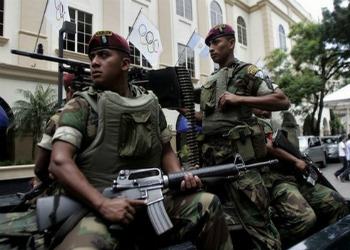Guatemala’s recent effort to demilitarize public security may represent a break from the heavy-handed anti-crime policies adopted across much of Latin America, and could set an example for other countries to follow.
An estimated 4,200 Guatemalan soldiers currently working with the National Civilian Police (Policia Nacional Civil – PNC) will suspend citizen security operations by the end of 2017, reported Prensa Libre.
The Defense and Interior Ministries have agreed to redeploy the 4,200 members of the Special Reserve Forces for Citizen Security (Cuerpo Especial de Reservas para la Seguridad Ciudadana) to assist in the fight against organized crime along Guatemala’s borders, protect the Maya Biosphere Reserve, and work with the Humanitarian Help and Rescue Unit (Unidad de Ayuda Humanitaria y Rescate).
The first half of the 4,200 soldiers will be reassigned in April 2017, while the remaining half will suspend joint operations with Guatemala’s civilian security forces in December.
InSight Crime Analysis
According to Prensa Libre, the first joint operations between Guatemala’s military and police forces began over a decade ago. By 2013, however, the United States reportedly started to pressure Guatemala to demilitarize its public security efforts. The decision to relocate 4,200 soldiers could be a response to external pressures, but it is also part of a larger battle playing out between different governmental institutions for control of state resources.
The citizen security squadrons in which the 4,200 soldiers were deployed received 202 million quetzals (approximately $26 million) in state funding per year. As is the case for many other Latin American countries, the military enjoys a significant degree of influence in Guatemala’s political landscape, a factor that layed the groundwork for the Central American country to give more resources and responsibility to the armed forces when it came to public safety. For similar reasons, many other Latin American governments have also called in the military to assist with anti-crime efforts in recent years.
SEE ALSO: Guatemala News and Profiles
In the long run, however, not only have militarized approaches to tackling organized crime led to increasing human rights abuses across the region, they have also turned out to be largely ineffective in the long run. Both the head of the Mexican armed forces and Peruvian President Pedro Pablo Kuzcynski have argued that involving the military in fighting crime has been a mistake, chiefly because the armed forces are created for the purpose of defending against and eliminating enemy forces; they are not trained to investigate crimes and carry out other duties typically associated with a civilian police force.
Seen in this light, the decision to demilitarize public security policies makes Guatemala something of an outlier among its Latin American neighbors, and perhaps an example to follow. The country has already stood out for its efforts to tackle deep-seated corruption, which other countries in the region have sought to emulate. It is possible that a similar dynamic could be seen if Guatemala’s experiment with demilitarization is successful.

